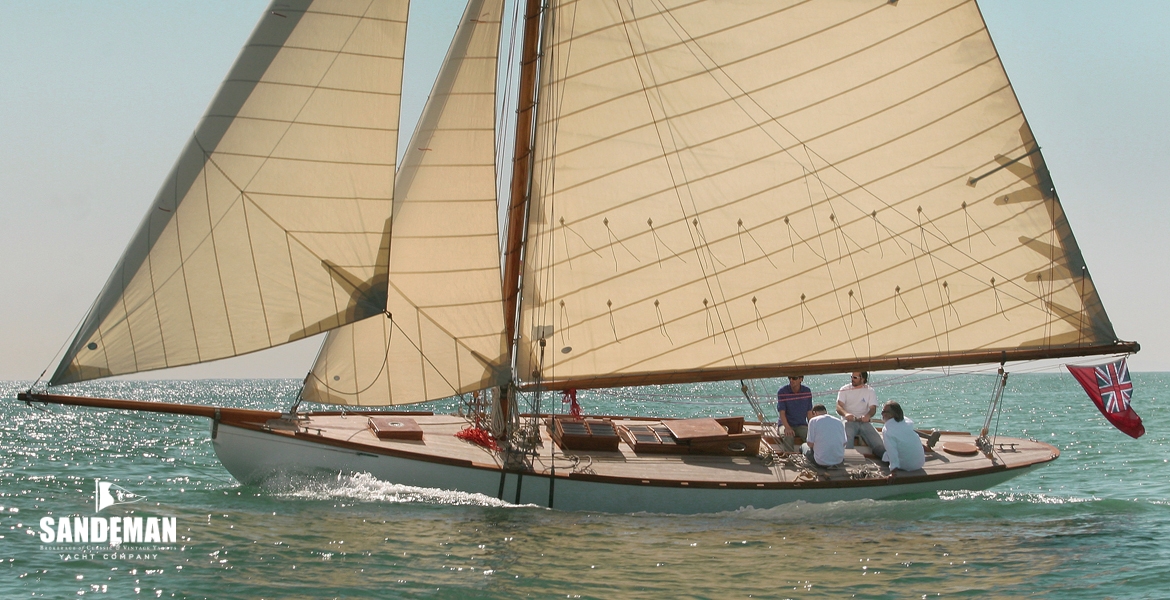
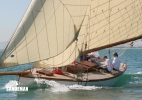
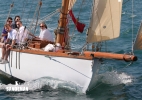
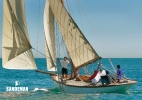
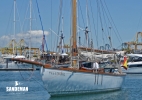
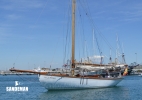
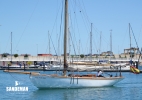
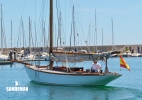
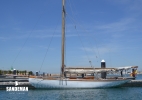
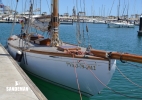
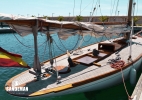
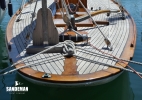
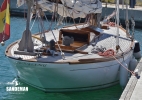
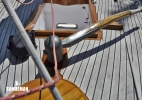
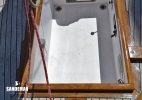
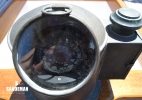
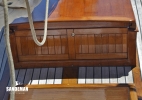
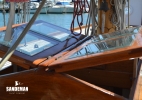
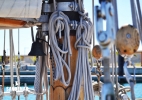
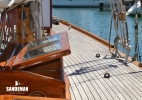
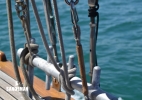
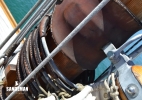
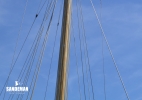
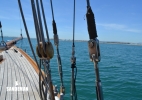
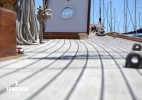
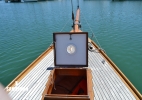
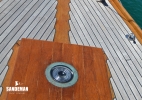
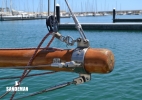
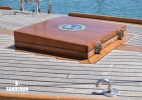
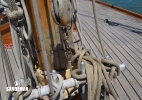
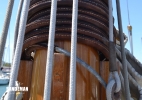
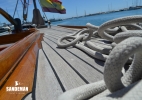
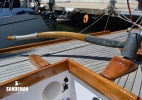
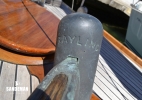
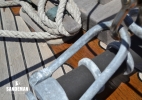
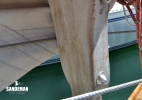
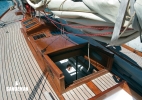
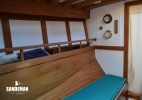
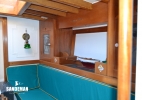
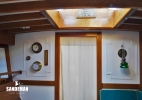
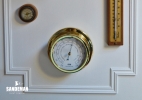
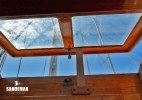
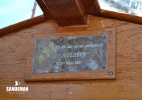
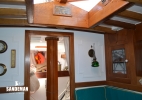
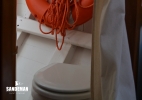
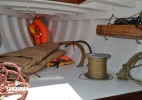
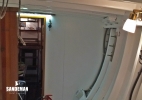
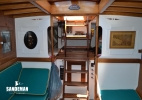
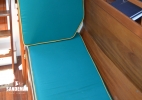
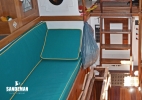
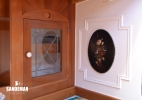
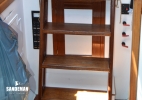
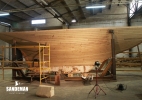
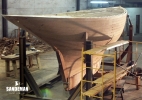
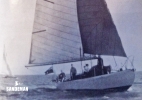
| Designer | J F Clyne |
|---|---|
| Builder | Stone of Brightlingsea |
| Date | 1900 |
| Length overall | 45 ft 0 in / 13.72 m |
| Length deck | 37 ft 6 in / 11.43 m |
| Length waterline | 28 ft 6 in / 8.69 m |
|---|---|
| Beam | 9 ft 0 in / 2.74 m |
| Draft | 6 ft 9 in / 2.06 m |
| Displacement | 9 Tonnes |
| Construction | Carvel iroko planking on oak frames |
| Engine | Lombardini 37 hp diesel 2007 |
|---|---|
| Location | Spain |
| Price | EUR 110,000 |
These details are provisional and may be amended
An English gentleman’s cruiser racer – What is there not to like here? GRAYLING’s lines and dimensions; especially her draft, imply she will be a lot of fun and fast enough for the classic circuit. Her volume below – with standing headroom almost throughout, means she can accommodate a small family and cruise too. A total restoration and modest price does render GRAYLING a contender both as a family yacht and / or to race in the prestigious Vintage Gaff Class.
Interested in GRAYLING in more detail.
- New deck caulking
- Removed all the fittings for treatment and re mounted
- Removed the rig and mast to varnish the mast, boom and gaff
- Varnish in interior; sole, saloon table, chart table
- New galley and head
- Removed and checked the fuel tank and changed the fuel hoses
- Changed the sea cocks
Little is recorded about GRAYLING’s designer, other than in old Lloyd’s registers. Clyne from Aberdeen was apparently an amateur yacht designer with GRAYLING to his name and only one other boat named MYTH, an 18 ft lug rigged dayboat with centreboard, built by Skinner and Sons in 1894. Clyne was however a yachtsman of some means as in the same 1894 register he is recorded as the owner of a spectacular yacht, THORA, a Wm Fife II 66 ft cutter. GRAYLING is recorded as having been built by Stones of Brightlingsea in 1900 and owned just one year later by a Mr Phil Herbert of Colchester; rigged as a yawl until 1907. She was then re rigged as Bermudan cutter.
In due course she was to be owned by one Albert Ogle and subsequently by CWR – Ron Winter who first saw her in the summer of 1954. In his book “The Run of the Tide: Forty Years of Coastal and Channel Cruising in Wooden Boats” published in 1990,Winter described GRAYLING as “Like the fish she was named after.” (a trout-like game fish with a pronounced dorsal fin.) “Fast, weatherly and very, very wet. I never ceased to wonder how she slipped through the water leaving apparently no wake… and many people remarked on this.” In all GRAYLING merited 7 chapters in the book.
A dismasting and subsequent rescue by the Harwich-Hook ferry had damaged GRAYLING’s counter stern in 1929. This weakness in her structure came back to haunt the yacht during Winter’s ownership, and while well meaning friends advised him to saw the counter off rather than pursue a difficult and costly repair, he could never bring himself to “commit such an act of vandalism,” Had Winter succumbed, GRAYLING’s form, with no plans now in existence, could not have survived.
In 1995 GRAYLING made a canal passage from the North Sea to the Mediterranean and in 2002 was found in very poor condition on the hard standing of a marina at Pueblo del Farnals near Valencia by her current owner who had stumbled upon her by chance. He couldn’t really afford her but like Ron Winter; he yearned after her, even in such an abandoned state. Eventually tracking down her owner he acquired the boat in 2007 with the help of his business partner and aiming to restore her.
The boat was seriously out of line, and with the deck removed, the first steps were to correct the shape as best they could. The tall Bermudan rig had been partly to blame - launched as a gaff yawl in 1900 she had been converted to Bermudan in 1908. More recently, the force exerted through a retro-fitted backstay had been stressing the counter stern.
Starting with new ribs inside old planking, the boat was then reframed in iroko, subsequently building-in the longitudinal stringers. Each job was in two parts: from bow to midships, then from midships aft aiming “to pursue a sense of achievement”. They knew the scale of the works required and were realistic about their need to feel the project evolve. Once the new deck beams went in, a ‘basket’ had been completed on which to lay the new iroko planking.
Although GRAYLING’s restoration was very much a rebuild, the original keelson was saved by bolting a new one over the top; the original letting in the garboard planks and the second keelson rebated for the new ribs and floors and going some way to keeping more of the original boat intact. Other original parts include the oak deadwood and stem, the Oregon pine boom, teak deckhouse, some metal fittings and the two beautiful teak gull-wing skylight frames. A key decision of course has been to return GRAYLING to the original gaff rig. She does sail close to wind and with a light touch on the tiller.
Original
- Pitch pine planking over oak frames
- Teak deck, superstructure and small cockpit
- Tiller appeared to be in metal from early the Winter´s book photos.
Restoration
- Today she is iroko planked over oak frames
- Timbers retained include the original stem, keel and ballast
- Oak beams
- Teak deck over marine plysubdeck
- Teak superstructure and skylights
- 2 x Tillers; one oak and the other stainless steel for the autopilot
- Oregon pine mast, boom, gaff, bowsprit and spinnaker pole
From Aft
- Varnished toe rail
- No winches on deck – all ash blocks
- Raw Iroko and bronze mooring cleat on centreline and elsewhere forward
- Boom crutch offset to port
- Mainsheet horse and blocks to deck rings outboard
- Varnished lazarette hatch
- Bronze and ash tiller
- Low varnished cockpit coamings
- Self draining cockpit
- Cockpit speaker, light fitting and engine controls stbd aft
- Bridge with compass binnacle
- Cleats outboard on deck each side
- Fwd cockpit with bridge before trunk cabin
- Sliding roof and low profile double door access to accommodation
- Skylight
- Butterfly skylight fwd
- Mast with single spreaders and leathered hoops for main sail
- Pinrails on deck and outboard
- Stainless steel chain plates
- Raised varnished fore hatch with port light
- Mooring cleats each side
- Bowsprit with stainless steel bob stay and fittings
- Bronze fairleads each side
- Galvanized 20 kg CQR anchor
- Galvanized 15 kg anchor for sand
- 20 m chain and rode
- Sliding hatch and opening double doors in trunk cabin
- 3 Companionway steps down to engine casing and 3 more to cabin sole
- Lobby area with stowage to sides and aft
- Fridge 220 V
- Saloon white painted
- Contrasting varnished beams
- Upholstered settee berths each side
- Shelf stowage outboard to port
- Shelf and glazed lockers outboard to stbd
- Skylight over with brass ship’s name plate inset
- Clock, barometer, hygro and thermometer fwd bulkhead
- Period oil lamp stbd bulkhead
- Curtain screen to head and foclse
- Jabsco manual WC
- Space for 2 children sleeping with fore hatch over
Gaff cutter rig
- Oregon pine mast, gaff and bowsprit new at restoration
- Oregon pine boom; more than 60 years old but in really good condition
- Galvanised steel fittings on mast and boom
- Spar fittings painted with powder coat in white (2017)
- Stainless steel standing rigging (2012 )
Sails by James Lawrence sailmakers Brightlingsea (2008)
- Working Jib
- Genoa
- Stay sail.
- Main sail
- Top sail with poles
- Working top sail
- Spinnaker
- Lombardini 37 hp diesel (2007)
- Engine control panel in cockpit
- Stainless steel shaft and three blade propeller
- Dry shaft seal
- 12 V electrics
- Navigation and interior lights
- 12 V panel
- 12 / 220V inverter
- Battery charger
- 3 x 12 V 60 Ah batteries
- Lights over 4 berths
- Lights in saloon
- 120 L custom plastic fuel tank
- Shore power connection and cable
NAVIGATION
- GPS antenna
- SIMRAD TP- 32 auto pilot
- GARMIN 158i GPS plotter
- Tack-tick wireless wind
- Steering compass
COMMUNICATIONS
- Raymarine VHF-DSC
- Zodiac CFR 260 ACTI-V tender (2013)
- Yamaha 2.5 HP 4 stroke outboard (2017)
- 2 x Electric bilge pumps
- Manual bilge pump in cockpit
- Flares, etc… changed every two years
- 7 x Adult lifejackets
- 3 x Child lifejackets
- Life ring
- Brass ship’s bell
- EPIRB
Contact us to discuss GRAYLING in more detail.
These particulars have been prepared from information provided by the vendors and are intended as a general guide. The purchaser should confirm details of concern to them by survey or engineers inspection. The purchaser should also ensure that the purchase contract properly reflects their concerns and specifies details on which they wish to rely.